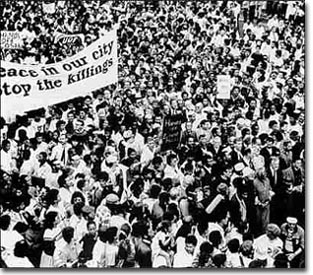 |
With the enactment of apartheid laws in South Africa in 1948, racial discrimination was institutionalized and racial violence ensued. It wasn't until April 1994 that South Africa held its first all-race elections that marked the final end of apartheid. But shortly before the end of the apartheid era, Amy Biehl, a 26-year-old Stanford University student and Fulbright Scholar, was murdered. She was a victim of racial violence. Amy was white. The convicted killers were four black youths. The killing drew international attention to South Africa’s racial violence.
Apartheid: racial segregation; specifically, a policy of segregation and political and economic discrimination against non-European groups in the Republic of South Africa.
 |
Amy dedicated herself to ending apartheid in South Africa. When she won a Fulbright Scholarship in 1992, Amy decided to go to South Africa to immerse herself in the country's culture and politics. Amy was based at the University of the Western Cape in Cape Town and was working in underprivileged communities. Amy helped with the voter registration in advance of the "Freedom Day" elections.
On the evening of Aug. 25, 1993, Amy Biehl drove through the Gugulethu township outside of Cape Town, South Africa, and fell prey to an angry group of black youths. They pelted Biehl's car with rocks, forcing her to stop, then dragged her from her car and murdered her. Biehl’s parents were at home in California when they received the devastating phone call which told them their daughter Amy had been beaten and stabbed to death in South Africa.
 |
Years later, the four youths convicted of murdering Amy and given prison sentences of eighteen years, applied for amnesty with South Africa's Truth and Reconciliation Commission (TRC). The TRC was created by Nelson Mandela's Government of National Unity in 1995 to enable South Africans to come to terms with an extremely troubled past. South Africa's apartheid system - and anti-apartheid struggle - resulted in violence and human rights abuses from which no section of society escaped. The TRC was established to investigate the violations that took place between 1960 and 1994, to provide support and reparation to victims and their families, and to compile a full and objective record of the effects of apartheid on South African society. Perpetrators of any politically-motivated acts - including violations or abuse - could apply for amnesty from the TRC in return for providing a full account of their actions.
In 1998, Biehl's killers were pardoned by the TRC (a decision the family endorsed) and released from prison after serving four years. At the amnesty hearings, the Biehls shook hands with their daughter's killers and Peter Biehl addressed the Commission amnesty hearings saying, "The most important vehicle of reconciliation is open and honest dialogue...we are here to reconcile a human life which was taken without an opportunity for dialogue. When we are finished with this process we must move forward with linked arms."
The Biehls said they believe their daughter would have supported the Commission’s decision to grant amnesty.
"Amy was drawn to South Africa as a student and she admired the vision of Nelson Mandela of a 'Rainbow Nation.'" It is this vision of forgiveness and reconciliation that we have honored," said the Biehls.
 |
Amy's parents went right to work to carry on their daughter's work in South Africa and to begin the healing process. Working for violence prevention, they established youth discussion groups, with the help of a South African psychologist, in the township where Amy was killed. To keep their daughter's memory and anti-apartheid legacy alive, the Biehls established a nonprofit agency, the Amy Biehl Foundation. The Foundation's motto is "weaving a barrier against violence." One of the Foundation's many programs is a bread-baking enterprise which helps generate employment in the community. The bread is called "Amy’s Bread – the bread of hope and peace." In September 1997, The United States Agency for International Development (USAID) agreed to provide $1.9 million to the Amy Biehl Foundation in support of its work to reduce community violence in townships and settlements around Cape Town.
"Amy has been a great teacher to me," Linda Biehl said. "I am proud to be Amy’s mother. Coping is dealing with what you have been forced to deal with. The more you can come to terms and go forward the better." And Peter Biehl says, "Our work is a celebration of our daughter's life."
Known for their extraordinary compassion, Peter and Linda Biehl are also world renowned as philanthropists and activists who work to improve the social and economic despair they saw as a key cause of their daughter's death.
After his daughter's death, Peter Biehl dedicated himself to the Foundation's work. Early in April 2002, Peter Biehl died suddenly from complications of colon cancer. He was 59.
Page created on 7/27/2012 5:40:45 PM
Last edited 4/15/2020 1:38:04 AM
